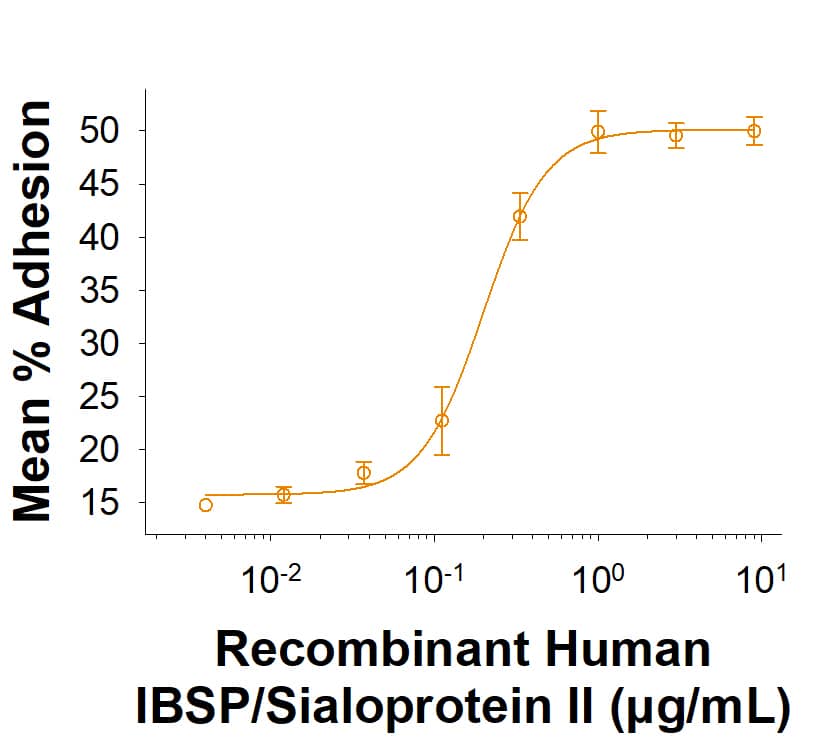Recombinant Human IBSP/Sialoprotein II Protein, CF
R&D Systems, part of Bio-Techne | Catalog # 4014-SP

Key Product Details
Product Specifications
Source
Phe17-Gln317, with a C-terminal 10-His tag
Purity
Endotoxin Level
N-terminal Sequence Analysis
Predicted Molecular Mass
SDS-PAGE
Activity
The ED50 of this effect is 0.0600 - 0.600 μg/mL
Scientific Data Images for Recombinant Human IBSP/Sialoprotein II Protein, CF
Recombinant Human IBSP/Sialoprotein II Protein Bioactivity.
Recombinant Human IBSP/Sialoprotein II Protein (Catalog # 4014-SP) supports the adhesion of MCF‑7 human breast cancer cells. The ED50 for this effect is 0.0600-0.600 µg/mL.Formulation, Preparation and Storage
4014-SP
| Formulation | Lyophilized from a 0.2 μm filtered solution in MES and NaCl. |
| Reconstitution |
Reconstitute at 100 μg/mL in sterile PBS.
|
| Shipping | The product is shipped at ambient temperature. Upon receipt, store it immediately at the temperature recommended below. |
| Stability & Storage | Use a manual defrost freezer and avoid repeated freeze-thaw cycles.
|
Background: IBSP/Sialoprotein II
IBSP (integrin-binding sialoprotein; also BSP or bone sialoprotein (II)) is a 55 - 75 kDa, secreted, variably glycosylated, monomeric noncollagenous member of the SIBLING family of extracellular matrix (ECM) proteins (1 - 3). It is principally associated with the early stages of bone mineralization. BSP is synthesized as a 317 amino acid (aa) precursor that contains a 16 aa signal sequence and a 301 aa mature region (4 - 6). The mature segment is divided into a basic N-terminus (aa 17 - 62), a central region (aa 63 - 233), and an acidic C-terminus (aa 234 - 317) (7).
Functional segments associated with the mature molecule include a type I collagen binding domain (aa 19 - 46), two non-RGD cell binding sites (aa 30 - 57 and 261 - 281), an RGD alphav beta3 integrin-binding site (aa 286 - 288) and two potential hydroxyapatite (HAp) nucleation domains (aa 76 - 83 and 151 - 158) (3, 4, 8 - 11). HAp formation requires a BSP nucleation site composed of at least eight consecutive glutamic acid residues and, likely, a contribution from a BSP-associated co-nucleator (10, 12). BSP is highly glycosylated, sulfated, and phosphorylated. Phosphorylation may impact HAp growth, while carbohydrate may regulate cell adhesion (1, 3, 13). Mature human BSP is 70%, 72%, 78%, and 72% aa identical to porcine, rat, canine, and mouse BSP, respectively. BSP is synthesized by megakaryocytes/platelets, osteoblasts, osteocytes, odontoblasts, osteoclasts, and bone marrow stromal cells (14 - 17).
References
- Qin, C. et al. (2004) Crit. Rev. Oral Biol. Med. 15:126.
- Alford, A.I. and K.D. Hankenson (2006) Bone 38:749.
- Ganss, B. et al. (1999) Crit. Rev. Oral Biol. Med. 10:79.
- Fisher, L.W. et al. (1990) J. Biol. Chem. 265:2347.
- Kerr, J.M. et al. (1993) Genomics 17:408.
- Kim, R.H. et al. (1994) Matrix Biol. 14:31.
- Zaia, J. et al. (2001) Biochemistry 40:12983.
- Tye, C.E. et al. (2005) J. Biol. Chem. 280:13487.
- Stubbs, J.T. et al. (1997) J. Bone Miner. Res. 12:1210.
- Tye, C.E. et al. (2003) J. Biol. Chem. 278:7949.
- Miyauchi, A. et al. (1991) J. Biol. Chem. 266:20369.
- Hakki, S.S. et al. (2006) J. Periodontol. 77:167.
- Wazen, R.M. et al. (2007) J. Histochem. Cytochem. 55:35.
- Kacena, M.A. et al. (2006) Bone 39:978.
- Bianco, P. et al. (1991) Calcif. Tissue Int. 49:421.
- Chen, J. et al. (1992) J. Bone Miner. Res. 7:987.
- Kreke, M.R. et al. (2005) Bone 36:1047.
Long Name
Alternate Names
Gene Symbol
UniProt
Additional IBSP/Sialoprotein II Products
Product Documents for Recombinant Human IBSP/Sialoprotein II Protein, CF
Product Specific Notices for Recombinant Human IBSP/Sialoprotein II Protein, CF
For research use only
